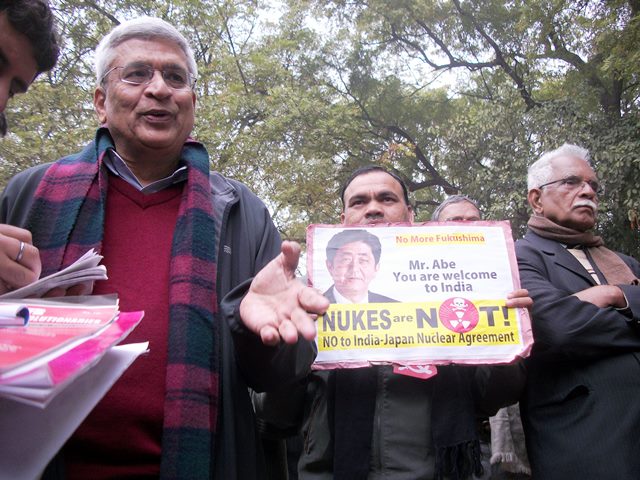By Abu Zafar, India Tomorrow,
New Delhi, 25 Jan 2014: As visiting Japanese Prime Minister Shinzo Abe met his Indian counterpart Dr Manmohan Singh here on Saturday left-wing activists and politicians protested at Jantar Mantar near Parliament against the expected India-Japan Nuclear Agreement.
Several academicians and activists are opposing nuclear plants being constructed in different parts of the country. After Japan’s Fukushima incident in 2011, such protests have widened across the country.
Abe will be chief guest of India on its 65th Republic Day.
Prakash Karat, general secretary of the Communist Party of India (Marxist) says both countries should not ink this agreement.
“We don’t want such plants here as we don’t want a Fukushima here in our country,” Karat told India Tomorrow at the Jantar Mantar protest site.
“Germany is one of the most technologically advanced countries in the world but it has shut all such nuclear power plants,” he added.
When asked about the growing need of electricity in the country, Karat said that energy produced by such pants will not fulfil the need.
“Only 7 to 8 percent of total electricity need will be fulfilled through these nuclear plants and it would be costlier than other energy sources that we have,” Karat told India Tomorrow.

Karat said that it is very dangerous as far as safety of human beings is concerned. According to him need of electricity will not be fulfilled through these plants and this electricity will be five or four fold costlier.
“We are opposing it as we opposed Russian plants in Kudankulam of Tamil Nadu,” he added.
Addressing the protesters Karat appealed to both PMs not to sign this agreement.
“I appeal to Prime Minister of Japan not to sign such agreement with India,” Karat said.
“I want to say to the Government of Japan and Indian Prime Minister that after incident of Fukushima Japanese government decided to shut plants and now establishing such plants in India is not justified,” he added
He asked common people to raise their voices against this and hoped that Japanese will also put pressure on their government for this cause.
“I hope people of Japan will also put pressure on their government against this issue.”
The Fukushima nuclear disaster happened on 11 March 2011. Plant was hit by tsunami and earthquake and it started releasing radioactive materials. It was the largest nuclear incident after Chernobyl disaster of Ukraine in 1986. Thousands of people died due to the earthquake and nuclear disaster.
Noted political analyst and journalist Praful Bidwai said that even Japanese people are against such plants.
“Nuclear technology is full of risks. If water supply to reactor stops for any reason for some minutes then it will become overheated and melt down,” Bidwai said while addressing the protesters.
“85 percent people of Japan are against such plant in their country,” he added.
Referring Fukushima incident he described as to how Japan suffered from it.
“Japan witnessed such melt-down in at least three reactors and more than one lakh people of Chernobyl are suffering from cancer,” he pointed out.
Chernobyl, a city of Ukraine, witnessed horrific nuclear accident in 1986 and left thousands of people dead.
Bidwai said that nuclear energy sector worldwide has faced slowdown as it declined from 17 percent to 10 percent.
Japan has 54 such reactors but all are closed following public pressure after Fukushima incident. Japanese government wanted to reopen these plants and even reopened two of them but due to public pressure they had to close them.
Like in New Delhi, such protests were held today in other parts of the country including Hyderabad, Kolkata, Bangalore, Jaitapur and Kudankulam.





